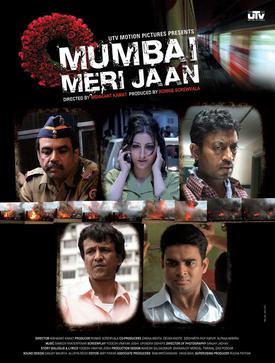| Mulund Train Bombing | |
|---|---|
| Location | Mumbai, India |
| Date | 13 March 2003 |
Attack type | Bombing |
| Deaths | 10 |
| Injured | 70 |
At 19:45 on 13 March 2003, a bomb exploded as a train pulled into the Mulund railway station. The bomb was placed in the first class ladies' compartment and killed 10 people and injured 70 more. [1] Among those killed were four women in the first class compartment, two of who were police constables, and six men who were in the adjoining second class compartment.
This was the third in a series of five bombings against the city within a period of eight months. The other bombings were:

The Mumbai Suburban Railway consists of exclusive inner suburban railway lines augmented by commuter rail on main lines serving outlying suburbs to serve the Mumbai Metropolitan Region. Spread over 390 kilometres (240 mi), the suburban railway operates 2,342 train services and carries more than 7.5 million commuters daily.

Matunga Road is the name of a railway station on the Western Line of the Mumbai Suburban Railway network. It offers access to Matunga and Shivaji Park areas of Mumbai. It should not be confused with the nearby Matunga railway station, which is on the Central Line just to the east. Matunga Road is one of the smallest railway halt in Mumbai in terms of number of passengers and number of platforms. The Ruparel College is the nearest college to this station. Fast local trains between Churchgate and Virar do not stop at Matunga Road station. It has been documented as the first suburban station on Western Railway to be run by all-women staff.

The history of Mumbai can be traced back to 600 BC, with evidence of the first known settlement of the Harrappan civilization discovered in the region.

Terrorism in India, according to the Home Ministry, poses a significant threat to the people of India. Compared to other countries, India faces a wide range of terror groups. Terrorism found in India includes Islamic terrorism, ultranationalist terrorism, and left-wing terrorism. India is one of the countries most impacted by terrorism.

INS Ranvir is the fourth of the five Rajput-class destroyers built for the Indian Navy. Ranvir was commissioned on 28 October 1986.

The 2006 Mumbai train bombings were a series of seven bomb blasts on 11 July. They took place over a period of 11 minutes on the Suburban Railway in Mumbai, the capital of the Indian state of Maharashtra and the nation's financial capital. The bombs were set off in pressure cookers on trains plying on the Western Line Suburban Section of the Mumbai Division of Western Railway. The blasts killed 209 people and injured over 700 more.
The following is the account given by the Mumbai Police Anti-Terrorist Squad of the investigation of the July 11, 2006 Mumbai serial train blasts which killed 209 people and injured over 700. A series of seven bomb blasts that took place over a period of 11 minutes on the Suburban Railway in Mumbai, the capital of Indian state of Maharashtra and the nation's financial capital. The bombs were set off in pressure cookers on trains plying the Western line of the Suburban Railway network. The convicts have been punished. 5 were sentenced to death and 7 were sentenced to life in prison.
At 21:15 on 28 July 2003 a bomb placed under a seat of a B.E.S.T. bus exploded on the busy Lal Bahadur Shastri Marg in Ghatkopar. The bomb was placed in the rear of the bus, killing four people and injuring 32. A man who was riding a motorcycle behind the bus and a woman who was in a rickshaw travelling near the bus were among those killed. An eyewitness said that the woman was thrown at least 10 feet away from the rickshaw and died on the spot.
At 18:45 IST on Monday, 2 December 2002, a bomb placed under a seat of a B.E.S.T. bus exploded near the busy Ghatkopar station. The bomb was placed in the rear of a bus near the station and killed two people and injured over 50. Ghatkopar being the final stop, all the passengers in the bus had just alighted and passengers for the return trip had not yet entered the bus. The people who were killed were in the busy station area.
On 27 January 2003, a bomb placed on a bicycle exploded near the busy Vile Parle railway station in Mumbai, India. The bomb killed one person and injured 28. The blast occurred when Atal Bihari Vajpayee, the Prime Minister of India at the time, was to visit the city.

Mumbai Meri Jaan is a 2008 Indian drama film directed by Nishikant Kamat and produced by Ronnie Screwvala. It stars R. Madhavan, Irrfan Khan, Soha Ali Khan, Paresh Rawal and Kay Kay Menon. It deals with the aftermath of the 11 July 2006 Mumbai train bombings, where 209 people lost their lives and over 700 were injured. It won multiple Filmfare Awards.
Mumbai, previously known as Bombay, is the financial capital of India and one of the most populous cities in the world. Mumbai grew into a leading commercial center of India during the 19th century on the basis of textile mills and overseas trade. After independence, the desire to domesticate a Marathi social and linguistic Mumbai to a cosmopolitan framework was strongly expressed in the 1950s. Mumbai, one of the earliest cities in India to be industrialized, emerged as the centre of strong organized labour movement in India, which inspired labour movements across India.
The history of Mumbai during the 21st century covers the Indian city of Mumbai in the 21st century.

The 2008 Mumbai attacks were a series of terrorist attacks that took place in November 2008, when 10 members of Lashkar-e-Taiba, a militant Islamist organisation from Pakistan, carried out 12 coordinated shooting and bombing attacks lasting four days across Mumbai. The attacks, which drew widespread global condemnation, began on Wednesday 26 November and lasted until Saturday 29 November 2008. A total of 175 people died, including nine of the attackers, with more than 300 injured.
Matunga Road is a neighbourhood in Mumbai. The Matunga Road railway station is located in Matunga Road area, on the Mumbai suburban railway on the Western Railway (India) railway line.

The class 3SUB were DC suburban electric multiple units introduced by the London and South Western Railway in 1915 and constructed by the Southern Railway in the period up to 1939. The class designation 3SUB was not used by the Southern Railway, although some authors refer to these units as 3SUB. When rebuilt to four cars in the 1940s, they became class 4SUB.

Mumbai–Pune Mail or Poona Mail was a luxurious train on Mumbai–Pune section by the Great Indian Peninsula Railway. It was the first intercity train started between Mumbai and Pune. This train and the famous Deccan Queen Express used to serve Mumbai Pune commuters for many years. Started as Mail in 1863, it was 303 Poona Mail in 1964. Got extension to Miraj past GC as 303 Bombay Mail in 1971 & become 303 Mahalaxmi Express during 1974 with final extension to Kolhapur. During Poona–Bangalore MG era, this connects 902 MG Poona Mail, 304 MG Bombay Mail & 304 MG Mahalaxmi Express by Section Carriage Interchanged at Poona & later at Miraj.

Kabir is a 2018 Indian Bengali-language action thriller film written and directed by Aniket Chattopadhyay, starring Dev and Rukmini Maitra which released on 13 April 2018.
The 2006 Ahmedabad railway station bombing was a blast at platform number 2/3 of Kalupur railway station Ahmedabad, India. 10-25 people sustained minor injuries. At the time of blast no train was present at the platform, two trains had passed before explosion and the Kutch express was about to arrive at the platform, the casualties and severity of the explosion may increased if any train was present at the platform.